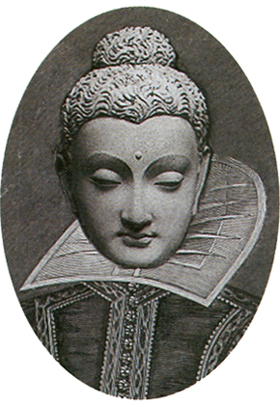What do William Shakespeare and Buddha have in common? Call it Jungian synchronicity: both left their wives and families in search of the meaning of existence, emerged during a religious revolution, and were sublime philosophers. More importantly, they held very similar viewpoints regarding how one should live life in order to attain bliss. The Buddha taught the Eightfold Path:
1. Right thought
2. Right understanding
3. Right speech
4. Right action
5. Right livelihood
6. Right effort
7. Right mindfulness
8. Right concentration
Another way to convey the Eightfold Path is to be found in Shakespeare’s play Hamlet during Polonius’ instructions to his son on how to live the perfect life. I couldn’t make this up even if I wanted to; there are eight precepts in Polonius’s speech, interchangeable (depending on how you interpret them) with the Buddha’s Eightfold Path:
Polonius: There; my blessing with thee! And these few precepts in thy memory see thou character.
1. Give thy thoughts no tongue, / Nor any unproportion’d thought his act. (right thought)
2. Be thou familiar, but by no means vulgar. (right mindfulness)
3. Those friends thou hast, and their adoption tried, / Grapple them to thy soul with hoops of steel, / But do not dull thy palm with entertainment / Of each new-hatch’d, unfledged comrade. (right livelihood)
4. Beware / of entrance to a quarrel, but being in, / Bear’t the opposed may beware of thee. (right action)
5. Give every man thy ear, but few thy voice. (right speech)
6. Take each man’s censure, but reserve thy judgment. (right concentration)
7. Costly thy habit as thy purse can buy, / But not express’d in fancy; rich, not gaudy; / For the apparel oft proclaims the man, / And they in France of the best rank and station / Are of a most select and generous chief in that. (right effort)
8. Neither a borrower nor a lender be, / For loan oft loses both itself and friend, / And borrowing dulls the edge of husbandry. / This above all: to thine own self be true, / And it must follow, as night the day, / Thou canst not then be false to any man. (right understanding)
As for comparing Polonius’s speech to his son with the Buddha’s Eightfold Path, whether one is better than the other, or if they’re saying the same thing, that’s up to the reader to determine.